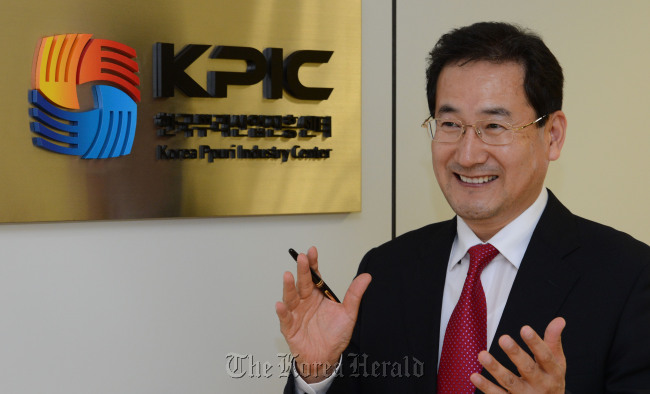Research center works to strengthen ‘roots’ of component manufacturing
By Park Hyung-kiPublished : June 6, 2012 - 19:03
KPIC chief says mid-level manufacturing should be automatic, clean and easy
About 25,000 parts are needed to make a single automobile. And almost 90 percent of those parts are developed by small and medium-size enterprises through the delicate craftsmanship, manufacturing process and techniques of molding, casting, plastic working, welding, and heat and surface treatments.
The situation is pretty much the same for making mobile handsets and ships in which Korea maintains global competitiveness.
These six manufacturing technology industries are not well known to the public as they operate behind the scenes, producing parts for consumer product manufacturers such as Hyundai Motor and Samsung Electronics.
Those who do know the industries usually shun working in those six areas as they are considered dangerous, dirty and difficult, commonly referred to as 3-D.
However, the National Fundamental Manufacturing Industry Promotion Center (Korea Ppuri Industry Center), headed by executive director Park Gyun-myoung, seeks to change this negative perception by supporting the six to become “automatic, clean and easy,” or ACE, industries.
“They are the ‘roots’ of Korea’s manufacturing industries, and they need to be strong so that the country can maintain its global strength in automobiles, shipbuilding and IT,” Park told The Korea Herald.
For instance, auto parts such as hoods need to be produced through molding techniques, while engine blocks are made via casting, Park noted, adding that a product manufacturer that has strong backing from the six industries will succeed overseas.
“This is the reason Hyundai Motor keeps on producing quality and globally renowned automobiles as the automaker maintains efficient parts manufacturing chains in the six areas with its vast networks of small and medium-size enterprises,” he said.
About 25,000 parts are needed to make a single automobile. And almost 90 percent of those parts are developed by small and medium-size enterprises through the delicate craftsmanship, manufacturing process and techniques of molding, casting, plastic working, welding, and heat and surface treatments.
The situation is pretty much the same for making mobile handsets and ships in which Korea maintains global competitiveness.
These six manufacturing technology industries are not well known to the public as they operate behind the scenes, producing parts for consumer product manufacturers such as Hyundai Motor and Samsung Electronics.
Those who do know the industries usually shun working in those six areas as they are considered dangerous, dirty and difficult, commonly referred to as 3-D.
However, the National Fundamental Manufacturing Industry Promotion Center (Korea Ppuri Industry Center), headed by executive director Park Gyun-myoung, seeks to change this negative perception by supporting the six to become “automatic, clean and easy,” or ACE, industries.
“They are the ‘roots’ of Korea’s manufacturing industries, and they need to be strong so that the country can maintain its global strength in automobiles, shipbuilding and IT,” Park told The Korea Herald.
For instance, auto parts such as hoods need to be produced through molding techniques, while engine blocks are made via casting, Park noted, adding that a product manufacturer that has strong backing from the six industries will succeed overseas.
“This is the reason Hyundai Motor keeps on producing quality and globally renowned automobiles as the automaker maintains efficient parts manufacturing chains in the six areas with its vast networks of small and medium-size enterprises,” he said.

Without promoting the basic fundamentals of such “mid-level” manufacturing technologies by SMEs, Korea cannot move on to develop advanced technologies or make low-tech products at cheaper costs. The country’s reliance on imports from China and Southeast Asia for low-tech parts, and Japan and Germany for high-tech parts would increase.
“The center’s support for SMEs will hopefully provide a foothold to develop more proprietary technologies in materials and parts, while continuing to make Korean conglomerates’ products globally attractive,” Park said.
The center, which is under the wing of the Korea Institute of Industrial Technology, in turn, aims to make those domestic six industries global as well. KITECH is part of the Ministry of Knowledge Economy.
With the legal framework in place, Park said the organization seeks to help accomplish this in two to three years by setting up centers abroad and assist with finding overseas partners with whom Korean SMEs can exchange know-how and jointly develop new manufacturing technologies.
It took just one year to devise a law promoting the country’s key “industrial tech roots,” Park noted, saying that this was a “miracle” given that lawmaking generally takes more than a year. The so-called Fundamental Manufacturing Industry Law, spearheaded by Park, was unanimously passed by the National Assembly last year, and went into effect in January this year. Benchmarking Japan’s Monozukuri, a 2006 law that aims to advance 21 manufacturing tech industries as part of efforts to overcome the Lost Decade, the center will provide financial assistance to research and development and boost human capital.
He added that the center will increase the number of supported areas from the current six as it makes headway going forward.
This year, the center began coordinating a project led by Korea’s Small & Medium Business Administration to help SMEs develop advanced automatic and robotic systems for their manufacturing and processing lines that cannot be handled by people as they are deemed too dangerous, dirty and difficult.
It will begin accepting applications and selecting companies to help them become advanced manufacturing tech firms in the six areas in July this year.
Park, a molding specialist, previously headed KITECH’s mold technology unit for almost 10 years before being appointed the center’s executive director early this year.
By Park Hyong-ki (hkp@heraldcorp.com)


















![[Today’s K-pop] Treasure to publish magazine for debut anniversary](http://res.heraldm.com/phpwas/restmb_idxmake.php?idx=642&simg=/content/image/2024/07/26/20240726050551_0.jpg&u=)